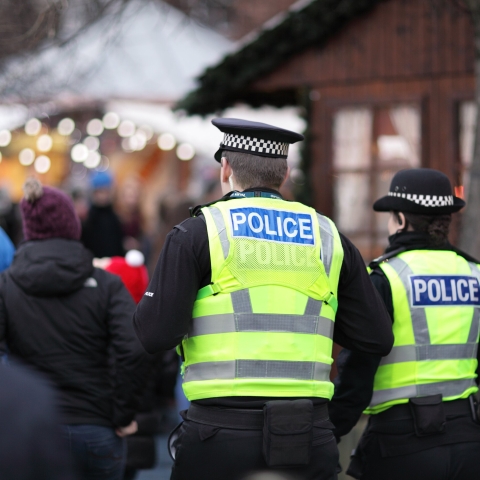

Exploring forensic interviewing and investigation
We're researching issues at the core of investigative interviewing
Our research in forensic interviewing looks at contemporary issues affecting how we gather reliable and complete information to allow for informed criminal justice decision-making, such as how information from the scene of a crime can be gathered, protected and interpreted.
Psychological research has repeatedly shown that information is only as good as the initial communication and memory tools used to gather it. If the information elicited or collected is less than full and faithful, then poor decisions – based on poor information – are likely to follow. Vital details can be missed, miscarriages of justice can occur, and investigations can fail – but our research is working to prevent this.
The Collaboration of Forensic Interviewing (CoFI) brings together an international network of researchers and practitioners that is driven to achieve excellence through partnerships, exchanges and research collaborations. Membership includes people from Australia, Canada, China, Cyprus, Dubai, Iceland, Ireland, Netherlands, New Zealand, Norway, Singapore, and USA.
Through a programme of research and innovation activities, the group aims to develop new research opportunities, conduct ground-breaking projects that support real world problems, and mentor group members at any stage of their career.
The group’s research centres around four themes:
Theme 1 — Front-line communication and ethical investigative interviewing
At the outset of any investigation it is vital that full and faithful information is attained. This fuels the investigation process as a whole, from decisions at the front line to the full investigative interview, legal decision making, and court processes. Ethical investigative interviewing is at the heart of attaining justice and cuts across all crime types, such as terror attacks, sexual offences, domestic abuse, burglary, and murder. Society needs to feel safe and protected.
Theme 2 — Vulnerability: A trauma informed approach
A core theme of our work has been to create innovative interviewing systems tailor-made for those deemed vulnerable in society — such as older adults, children, people with learning disabilities, and war crime victims — to ensure that everyone is given a voice. Such groups are often the target of offenders. Nevertheless, they are under-represented within the criminal justice system.
Theme 3 — Decision making across the criminal justice system
Unbiased decision-making is crucial to ensure that justice is equitable across society. Everyone who works within the criminal justice system is aiming to make informed decisions: emergency responders, legal practitioners, the probation service, and parole board members. This stream of work examines what factors impact upon the efficiency of such critical decisions.
Theme 4 — Making a difference in the real world: From theory to impact
Research has shown that it is difficult to transfer what we learn from the laboratory into the field. This theme concerns this transference process – how can we establish maximum impact? What are the barriers and enablers to achieving maximum reach?
Research impact
CoFI is at the forefront of research into police interview techniques. Our research on best practice in dealing with traumatised interviewees was drawn on directly in the aftermath of terror attacks, such as those in the UK, Norway, France and the USA.
Our research has demonstrated the importance of careful triage of victims and witnesses using appropriate interview techniques, both to avoid further harm, and to extract essential investigative information rapidly and effectively. This research now forms the basis of Witness Interview Strategies for Critical Incidents (WISCI), a framework for policy and practice adopted by UK police, and by international partner organisations. This is a vital contribution to public safety confronted with the increasing threat, and reality, of terror attacks.
Our research has also helped to create procedures that improve the quality of interviews of witnesses, victims, intelligence sources, and suspects of crime across many countries, including:
- National and International Guidance, Policy and Practice: e.g. Achieving Best Evidence Guidance (Ministry of Justice, 2007; 2011; 2022)
- UN Police training manual (2021)
- UN Mendez principles (2021)
- Improving Witness Testimony, Parliament Briefing (2019)
Publication highlights
-
From verbal account to written evidence: Do written statements generated by officers accurately represent what witnesses say?
Milne, R., Nunan, J., Hope, L., Hodgkins, J., Clarke, C. (2022) "From verbal account to written evidence: Do written statements generated by officers accurately represent what witnesses say?", Frontiers in Psychology
-
To know where the bodies are buried: the use of the cognitive interview in an environmental scale spatial memory retrieval task
Ryan, N., Westera, N., Kebbell, M., Milne, B., Mark, H. (2020) "To know where the bodies are buried: the use of the cognitive interview in an environmental scale spatial memory retrieval task", Applied Cognitive Psychology
-
Responding to reticence in investigative interviews of alleged victims with mental illness: Maintaining rapport.
Aker, T., Risan, P., Milne, R. (2023) "Responding to reticence in investigative interviews of alleged victims with mental illness: Maintaining rapport.", Nordic Journal of Studies in Policing
-
Police interviews with adult reporters of historical child sexual abuse: Exploring the link between verbal rapport and information obtained
Chenier, K., Shawyer, A., Milne, R., Williams, A. (2022) "Police interviews with adult reporters of historical child sexual abuse: Exploring the link between verbal rapport and information obtained", Child Abuse & Neglect
-
Can a communication assessment provide a reliable indication of a child’s communication at interview?
Smethurst, A. J., Carthy, N., Milne, B., Gillespie-Smith, K., Collins, K. (2021) "Can a communication assessment provide a reliable indication of a child’s communication at interview?", Psychology, Crime & Law
-
The influence of interview style on SIOs’ responsiveness to the suspect’s alibi
van Beek, M., Bull, R., Chen, M., Fahsing, I., Milne, R. (2022) "The influence of interview style on SIOs’ responsiveness to the suspect’s alibi", Journal of Police and Criminal Psychology
-
Identifying challenges to critical incident decision-making through macro-, meso-, micro- lens: A systematic synthesis and modified narrative analysis of contemporary evidence
May, B., Milne, R., Shawyer, A., Meenaghan, A., Ribbers, E. (2023) "Identifying challenges to critical incident decision-making through macro-, meso-, micro- lens: A systematic synthesis and modified narrative analysis of contemporary evidence", Frontiers: Organizational Psychology
-
Fuelling an investigative mindset: the importance of pre-interview planning in police interviews with suspects
Chin, J., Milne, R., Bull, R. (2022) "Fuelling an investigative mindset: the importance of pre-interview planning in police interviews with suspects", Psychology, Crime & Law
-
Mind the Gap: bridging evidence-based witness identification procedures to practice through police training
Cecconello, W. W., Fitzgerald, R., Milne, R., Milnitsky Stein, L. (2022) "Mind the Gap: bridging evidence-based witness identification procedures to practice through police training", International Journal of Police Science & Management
-
Managing interviews in high-stake crime cases: practice guidance for developing suspect interview strategies using a LOST WEBSITES framework
Vaughan, M., Milne, R., Dalton, G., Retford, S. (2022) "Managing interviews in high-stake crime cases: practice guidance for developing suspect interview strategies using a LOST WEBSITES framework", The Journal of Forensic Practice
Facilities
With industry-standard digital recording equipment, and access to academic knowledge of forensic interviewing procedures and practical policing, CoFI provides a range of opportunities for practitioners, students and academics within the ever-growing world of investigative interviewing.
Digital recording equipment (provided by Indico Systems) captures audio and video from our fully-furnished interview rooms, and saves all files securely to a private network. This allows users to show live footage of an interview, scan through recordings, and bookmark significant moments.
Teaching and training
Teaching
Explore the full range of undergraduate and postgraduate degrees we offer within the School of Criminology and Criminal Justice.
You can also read about our short courses and CPD programmes in criminal justice studies, or find postgraduate research opportunities in Criminology. If you are interested in beginning a research project, please contact Professor Becky Milne in the first instance.
Training
Training is available for all types of investigator, from those learning the basics to advanced practitioners.
Our programmes are designed to share techniques to investigators to obtain the optimal evidence from interviews with suspects, victims and witnesses while emphasising transparency, ethical values and the requirements that all evidence should be admissible in criminal and civil environments. All programmes meet the UK National Occupational standards and are delivered by academics and experienced practitioners in the field. The following courses are available:
- PIP Level 2 & PIP Level 2 Specialist
- Training for trainers
- Investigative interviewing: the SIO perspective
- Investigative interviewing: the fundamentals
The Centre provides a practical policing solution in a University environment for investigative interviewing - one of the first of its kind.
Assessment of interviewer skill competence
We offer an assessment service of organisations' interviewer skills, providing feedback at individual interviewer level and organisational advice.
Masterclasses
The Masterclass programme is a series of workshops led by international experts, both academics and practitioners, in areas such as detecting deceit, vulnerable groups (people with learning disability, people with mental disorders, children and the elderly), sex offenders, the role of the intermediary, and fitness for interview.
Bespoke training
Where a course is not currently available to meet your training needs, we can produce bespoke packages to fit your specific organisational requirements.
Past events
Completed training events cover themes such as:
- Interviewing suspects in cases of alleged sex crime
- Historic abuse cases: psychological and investigative challenges
- Analysing investigative information using SE3R
- Putting theory into practice – interviews with suspects in the real world
- Interviewing vulnerable adults with intellectual disabilities
- Interview strategy: the SIO perspective
- The cognitive interview
- The content analysis approach in assessing statement credibility
Partnerships and collaborations
The group works closely with the International Investigative Interviewing Research Group (iIIRG), a network of people with collaborative interests, working with international bodies committed to improving investigative interviewing (internationally) and ensuring improvements are underpinned by a robust evidence base.
The group is linked with the Centre for Research and Evidence on Security Threats (CREST), a national hub for understanding, countering and mitigating security threats. Read Becky Milne's CREST Guide to the Cognitive Interview.
The group also collaborates with UK Counter-Terrorism Network and the Metropolitan Police.
The group collaborates with UK Counter-Terrorism Network and police organisations around the world. We also work closely with the Norwegian Center of Human Rights, University of Oslo.
A number of our PhD students work for, and are funded by, criminal justice organisations including:
- Garda Siochana
- College of Policing scholarship
- City of London Police
- Ministry of Home Affairs - Singapore
- Greater Manchester Police
- US police
- Canadian Police
Researchers
Group lead:

Professor Becky Milne
Explore our research
School of Criminology and Criminal Justice
Read more about the School of Criminology and Criminal Justice, and explore the teaching and research activities that take place within it.

Cybercrime and Cybersecurity Group
We're researching how crime takes place using technology, such as cyber fraud, hacking, online abuse, and its impact on individuals and society.

Economic Crime Research Group
We're researching the scale, impact and cost of economic crimes — such as fraud, corruption and money laundering.

Forensic Science Group
The forensic science research group at the University of Portsmouth is using science to identify, reconstruct and inform how crime is investigated.

Missing Persons Group
We're researching patterns of behaviour that may precede a person going missing and working to improve how cases are handled.

Policing Research Group
We're working in collaboration with local, national and international police organisations to research the social, economic and political context in which policing operates.

Probation, Prison and Penology Group
The University of Portsmouth is working to better understand the role of punishment & how this links with processes of justice and rehabilitation to promote change.

Victimology and Ecological Justice Group
We're researching victims and victimisation, inequality, domestic and online abuse, ecological justice, wildlife crime and climate change.



